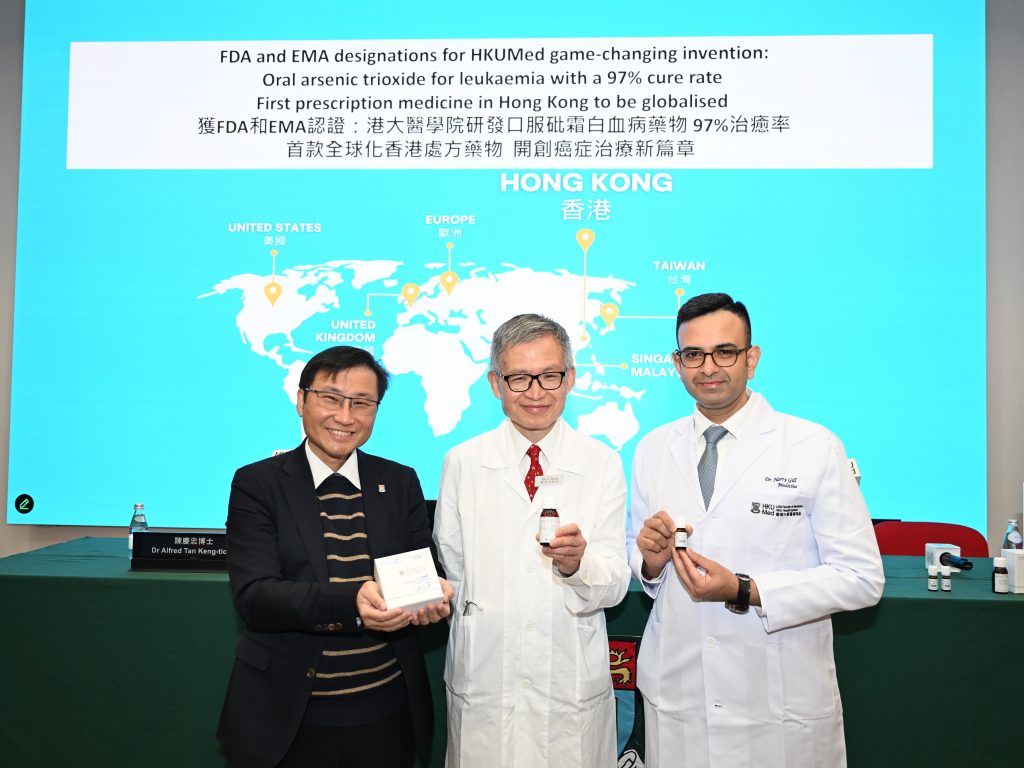May 2025 | Volume 26 No. 2
In the Blood
Listen to this article:
Scientists at HKUMed have invented a groundbreaking regimen – an oral formulation of arsenic trioxide (oral-ATO, or ARSENOL®) – for the treatment of acute promyelocytic leukaemia (APL), a blood cancer which has a high fatality rate. They have been developing the treatment over the past 25 years, and it is the first prescription medication invented and manufactured in Hong Kong to obtain European, US and Japanese patents.
There are three parts to the treatment – oral-ATO, all-trans retinoic acid (ATRA) and ascorbic acid (AAA) – the first is a solution and the second two are in pill form. Significantly, it is a chemotherapy-free regimen, meaning far less discomfort for patients, and it can be administered on an outpatient basis with no need for hospitalisation.
Lead investigator Professor Harry Gill, Clinical Associate Professor in the School of Clinical Medicine of HKUMed, said: “The ‘AAA’ regimen is a game-changer – highly effective and safe for all risk categories of APL patients. Oral-ATO is used first to treat patients with APL and then becomes the maintenance treatment for patients in first complete remission, resulting in a 97 per cent five-year leukaemia-free survival (LFS) rate and a 97 per cent overall survival (OS) rate.
“A five-year survival rate refers to the proportion of patients surviving at five years following the diagnosis of APL. That essentially means these patients are cured. Before oral-ATO was available, the treatment was with ATRA and chemotherapy alone and survivals were between 60–70 per cent at five years taking into account early deaths that occurred during the initial phase of treatment.”
Less trauma
The all-important chemo-free aspect makes the treatment less traumatic for patients. “Since 2018 we have been using a completely chemotherapy-free regimen,” said Professor Gill. Conventionally, APL is treated with ATRA and chemotherapy or with the intravenous formulation of ATO that carries higher risks of treatment-related side effects and impairments to quality of life.
“Not only is this treatment less harsh but patients are not exposed to risk of infections such as toxicity or damage to the heart, liver or kidney. Nausea, vomiting, hair loss – all of these impairments to quality of life can be avoided or minimised. Side effects are usually very mild – grade one and grade two in medical terms, such as mild headache, possibly mild gastric discomfort.”
Professor Gill has worked on the treatment since 2007 with the inventors of its initial formulation Professor Cyrus Kumana and Professor Kwong Yok-lam, and initially conducted pre-clinical and phase I studies. Next came the clinical development with phase II studies, and the establishment of Good Manufacturing Practice-grade oral-ATO and obtaining the European Medicines Agency (EMA) and US Food and Drug Administration (FDA) designations through clinical research in APL.
“During our first study between 2002–2017, we treated patients who had relapsed APL. At that time, such patients would require a bone marrow transplant, which involved chemotherapy, discomfort and potential complications. This treatment obviated the need for a transplant in relapsed APL. The findings of this study were published in 2018.”
Remission maintenance
Subsequently, the HKUMed research team started to use oral-ATO as the maintenance treatment for APL patients in first complete remission. The findings from this were published in 2020. The next step was the incorporation of oral-ATO into frontline treatment for newly diagnosed APL patients, achieving 100 per cent LFS and OS at five years. The findings were published in 2019. Since 2018, the chemotherapy-free oral-AAA regimen has been fully implemented and initial findings were presented at the American Society of Hematology annual meeting in December 2023.
Oral-ATO (ARSENOL®) is now available in Hong Kong, Macau, Singapore and Malaysia as part of clinical trial or routine clinical use for APL. It has obtained orphan drug designation from both the US FDA and the EMA, as well as the Investigational New Drug designation from the US FDA.
As a result of these designations, oral-ATO will be used in Europe and North America as part of phase III international studies in 2025. Additionally, an investigator-led phase III study will be conducted in the UK in collaboration with the University of Cardiff. The team’s aim is to complete the phase III clinical studies in APL and also continue researching its efficacy for other diseases.
“We are testing on other malignancies,” said Professor Gill, “and have seen efficacies for mantle cell lymphoma, NPM1-mutated AML, and TP53-mutated AML – but so far, we have not published it as we are applying for patents. We have done pre-clinical work for autoimmune disorders such as systemic lupus erythematosus and rheumatoid arthritis showing positive findings.”
Summing up, Professor Gill said: “It has been a remarkable achievement with oral-ATO that has led to improvement in patients’ survivals and quality of life. Translating research into improvements in patient care is our ultimate aim.”

Professor Harry Gill (right) and Professor Kwong Yok-lam (centre) introducing oral-ATO to the press.
It has been a remarkable achievement with the oral formulation of arsenic trioxide that has led to improvement in patients’ survivals and quality of life.

Professor Harry Gill

